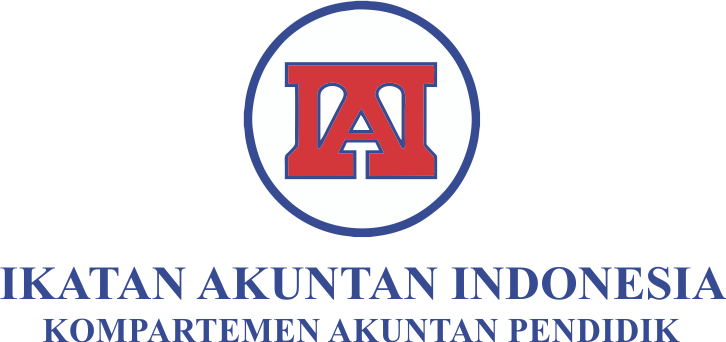REMUNERASI EKSEKUTIF DAN NILAI PERUSAHAAN: DAMPAK PANDEMI COVID-19
Abstract
ABSTRACT
This study aims to examine the effect of executive remuneration and the covid-19 pandemic on firm value. The population of this study are companies listed on the Indonesia Stock Exchange in 2018 - 2020. This research is included in quantitative research and the data used are secondary data. The sampling method of this study uses the purposive sampling method. This study uses panel data regression and is processed using the EViews 10 program. The estimation method used in this study is the Fixed Effect Model (FEM. The results show that remuneration has no significant effect on firm value. However, the Covid-19 pandemic has a significant negative effect on firm value). In addition, the average executive remuneration received during the covid-19 pandemic is greater than the average remuneration received before the Pandemic. However, this average difference is not statistically significant. The implication of this research is that the Covid-19 pandemic resulted in the decline in the firm value in Indonesia, so that investors are more careful in investing in the capital market during the pandemic, and shareholders are more concerned about the remuneration scheme given to executives because there are no significant results that executive remuneration can increase the firm value.
Keywords: Covid -19; Firm Value; Remuneration;
ABSTRAK
Penelitian ini bertujuan untuk menguji pengaruh remunerasi eksekutif dan pandemi covid-19 terhadap nilai perusahaan. Populasi penelitian ini adalah perusahaan yang terdaftar di Bursa Efek Indonesia tahun 2018 – 2020. Penelitian ini termasuk ke dalam penelitian kuantitatif dan data yang digunakan adalah data sekunder. Metode sampling penelitian ini menggunakan metode purposive sampling. Penelitian ini menggunakan regresi data panel dan diolah menggunakan program EViews 10. Metode estimasi yang digunakan penelitian ini adalah Fixed Effect Model (FEM). Hasil penelitian menunjukkan bahwa Remunerasi tidak berpengaruh signifikan terhadap nilai perusahaan. Akan tetapi, Pandemi Covid-19 berpengaruh negatif signifikan terhadap nilai perusahaan. Selain itu, rata – rata remunerasi eksekutif yang diterima saat pandemi covid-19 lebih besar daripada rata-rata remunerasi yang diterima sebelum Pandemi. Akan tetapi selisih rata – rata ini secara statistis tidak signifikan. Implikasi penelitian ini adalah Pandemi Covid-19 mengakibatkan penurunan pada nilai perusahaan di Indonesia, sehingga investor lebih berhati -hati dalam investasi di pasar modal saat pandemi. Serta, shareholder lebih memperhatikan terkait skema remunerasi yang diberikan kepada eksekutif karena tidak ditemukan hasil signifikan bahwa Remunerasi eksekutif dapat meningkatkan nilai perusahaan.
Kata Kunci: Covid-19; Nilai Perusahaan; Remunerasi;Keywords
Full Text:
PDFReferences
Bebchuk, L. A., & Fried, J. M. (2003). Executive compensation as an agency problem. Journal of Economic Perspectives, 17(3), 71–92. https://doi.org/10.1257/089533003769204362
Braendle, U. C., & Rahdari, A. H. (2016). Corporate Governance and Remuneration. In The Theory and Practice of Directors’ Remuneration (pp. 3–20). Emerald Group Publishing Limited. https://doi.org/10.1108/978-1-78560-683-020151001
Ding, H., Fan, H., & Lin, S. (2022). COVID-19, firm exposure, and firm value: A tale of two lockdowns. China Economic Review, 71, 101721. https://doi.org/10.1016/j.chieco.2021.101721
Donthu, N., & Gustafsson, A. (2020). Effects of COVID-19 on business and research. Journal of Business Research, 117, 284–289. https://doi.org/10.1016/J.JBUSRES.2020.06.008
Eisdorfer, A., Giaccotto, C., & White, R. (2013). Capital structure, executive compensation, and investment efficiency. Journal of Banking and Finance, 37(2), 549–562. https://doi.org/10.1016/j.jbankfin.2012.09.011
Fama, E. F. (1998). Market efficiency, long-term returns, and behavioral finance. Journal of Financial Economics, 49(3), 283–306. https://doi.org/10.1016/S0304-405X(98)00026-9
Fama, E. F., & Jensen, M. C. (2019). Separation of ownership and control. In Corporate Governance: Values, Ethics and Leadership (pp. 163–188). Taylor and Francis. https://doi.org/10.1086/467037
Gibbons, R., & Murphy, K. J. (1992). DOES EXECUTIVE COMPENSATION AFFECT INVESTMENT? Journal of Applied Corporate Finance, 5(2), 99–109. https://doi.org/10.1111/j.1745-6622.1992.tb00493.x
Gujarati, D. N. (2003). Basic Econometrics (4th ed.). McGraw-Hill.
Kim, K. A., Nofsinger, J. R., & Mohr, D. J. (2010). Corporate governance. Pearson.
Kumar Verma, A., & Prakash, S. (2020). Review Paper Impact of COVID-19 on environment and society. Journal of Global Biosciences, 9(5), 7352–7363. www.mutagens.co.in
Natsir, K., & Yusbardini, Y. (2020). The Effect of Capital Structure and Firm Size on Firm Value Through Profitability as Intervening Variable.
Nhamo, G., Dube, K., & Chikodzi, D. (2020). Counting the Cost of COVID-19 on the Global Tourism Industry. Counting the Cost of COVID-19 on the Global Tourism Industry. https://doi.org/10.1007/978-3-030-56231-1
Probohudono, A. N., Perwitasari, D., & Putra, R. P. (2016). Faktor-Faktor Yang Memengaruhi Remunerasi Direksi: Studi Komparasi Perusahaan Di Australia, Singapura, Indonesia, Dan Malaysia. Jurnal Akuntansi Dan Keuangan Indonesia, 13(1), 52–69. https://doi.org/10.21002/jaki.2016.03
Riley, J. G. (2001). Silver Signals: Twenty-Five Years of Screening and Signaling. Journal of Economic Literature, 39(2), 432–478. https://doi.org/10.1257/JEL.39.2.432
Ross, S. A. (1977). DETERMINATION OF FINANCIAL STRUCTURE: THE INCENTIVE-SIGNALLING APPROACH. Bell J Econ, 8(1), 23–40. https://doi.org/10.2307/3003485
Sekaran, U., & Bougie, R. (2016). Research methods for business: A skill building approach. john wiley & sons.
Seth, R., & Mahenthiran, S. (2022). Impact of dividend payouts and corporate social responsibility on firm value – Evidence from India. Journal of Business Research, 146, 571–581. https://doi.org/10.1016/J.JBUSRES.2022.03.053
Sigler, K. (2011). CEO Compensation and Company Performance.
Spence, M. (2002). Signaling in Retrospect and the Informational Structure of Markets. American Economic Review, 92(3), 434–459. https://doi.org/10.1257/00028280260136200
Sucuahi, W., & Cambarihan, J. M. (2016). Influence of Profitability to the Firm Value of Diversified Companies in the Philippines. Accounting and Finance Research, 5(2). https://doi.org/10.5430/afr.v5n2p149
Sudiyatno, B., Puspitasari, E., Suwarti, T., & Asyif, M. M. (2020). Determinants of Firm Value and Profitability: Evidence from Indonesia. The Journal of Asian Finance, Economics and Business, 7(11), 769–778. https://doi.org/10.13106/JAFEB.2020.VOL7.NO11.769
Tuna, G., & Tuna, V. E. (2022). Are effects of COVID-19 pandemic on financial markets permanent or temporary? Evidence from gold, oil and stock markets. Resources Policy, 76, 102637. https://doi.org/10.1016/J.RESOURPOL.2022.102637
Xie, S., Lin, B., & Li, J. (2022). Political Control, Corporate Governance and Firm Value: The Case of China. Journal of Corporate Finance, 72, 102161. https://doi.org/10.1016/J.JCORPFIN.2022.102161
DOI: https://doi.org/10.37058/jak.v17i2.6748
Refbacks
- There are currently no refbacks.
Copyright (c) 2023 JURNAL AKUNTANSI

This work is licensed under a Creative Commons Attribution-NonCommercial-ShareAlike 4.0 International License.

Jurnal Akuntansi by Jurusan Akuntansi Fakultas Ekonomi dan Bisnis Universitas Siliwangi is licensed under a Creative Commons Attribution-NonCommercial-ShareAlike 4.0 International License.
Based on a work at http://jurnal.unsil.ac.id/index.php/jak.
Jurnal Akuntansi Visitor Counter JAK Stats





